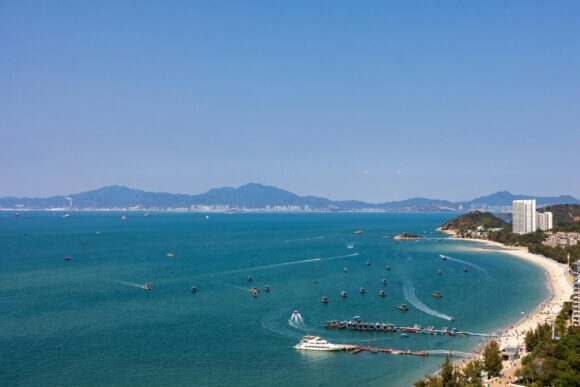A Chinese national has been sentenced to three years in prison for damaging an undersea cable that connects Taiwan’s main island to the outlying Penghu islands, located in the Taiwan Strait.
The man, identified only by his surname Wang, was the captain of the Hong Tai 58, a ship registered under the flag of Togo.
The ruling by the Tainan District Court, delivered on Thursday, represents the first sentencing related to a series of reported incidents in recent years involving the severing of undersea cables around Taiwan.
Taiwanese authorities have accused Beijing of targeting the island’s undersea infrastructure in a campaign of so-called “grey zone” tactics aimed at exerting pressure on the self-governed territory, which China claims as part of its sovereign territory. China, however, has rejected such allegations, maintaining that these incidents are “common maritime accidents” that have been “exaggerated” by Taipei.
Undersea cables, consisting of insulated wires laid on the ocean floor, are responsible for carrying the vast majority of the world’s internet traffic.
According to the International Cable Protection Committee, an estimated 150 to 200 faults are recorded annually across global undersea cable systems.
Taiwan is connected by 10 domestic and 14 international undersea cables. The court stated that the disruption of cables linking the main island to Penghu had “seriously interfered with the government and society’s operations.”
“The impact is enormous, and the defendant’s actions should be severely condemned,” the court said in its statement following the sentencing.
The incident occurred in February when Taiwan’s coast guard observed the Hong Tai 58 anchored off Taiwan’s southern coastline for several consecutive days. Coast guard authorities broadcast multiple warnings instructing the vessel to leave the area.
Shortly after Hong Tai 58 departed the vicinity during the early morning hours of February 25, the coast guard received notification that one of the undersea cables in that region had been severed.
The vessel was subsequently escorted back to Taiwan for investigation. Its crew, composed of eight Chinese nationals, was detained during the inquiry.
Of the eight crew members, only Mr. Wang was charged, while the remaining individuals were reportedly repatriated to China.
Initially denying responsibility for damaging the cable, Mr. Wang later admitted during the trial that he “might have broken the cable.” He told the court that challenging sea conditions had made navigation difficult, prompting him to order the crew to drop anchor without knowledge that the waters contained undersea cables.
Mr. Wang, who did not secure legal representation, said he was unaware of the cables beneath the ship when anchoring.
Prosecutors, however, maintained that Mr. Wang had intentionally caused the damage. They cited electronic navigational charts on board the vessel that clearly indicated the cable’s location.
According to Hsu Shu Han, the lead prosecutor in the case, the Hong Tai 58 was “highly suspicious” from the outset. Speaking to BBC Chinese in May, Hsu noted that the vessel had only one cargo record for the previous year and was in poor condition, yet it continued to sail around the Taiwan Strait.
Prosecutor Hsu also said the vessel had operated under multiple names and that Mr. Wang had intentionally withheld details about the ship’s ownership. The owner has not yet been identified.
Testimony from Taiwan’s Coast Guard indicated that most vessels move in a circular motion around their anchor point. However, Hong Tai 58 had dragged its anchor in a straight line across the seabed, while prosecutors added that the ship also maneuvered in a zigzag pattern around the location of the undersea cable.
Forensic analysis showed that the damaged section of the cable aligned exactly with the ship’s anchoring point and bore marks consistent with having been snagged by an external force.
Taiwanese authorities reported 36 cases of undersea cable damage caused by external forces between 2019 and 2023.
Concerns over possible sabotage—especially from China—have been growing in Taiwan. In January, Taiwan accused a Chinese-owned ship of damaging another undersea cable off its northern coast. The ship’s owner denied responsibility, as reported by Reuters.
Kuan Bi-ling, Minister of Taiwan’s Ocean Affairs Council, said Hong Tai 58 was one of 52 vessels under surveillance by Taiwanese authorities for engaging in potentially suspicious activities.
Such suspicions are not confined to Taiwan. In November of last year, a Chinese ship was accused of cutting two fibre-optic undersea cables in the Baltic Sea. A Swedish investigation earlier this year found no conclusive evidence to confirm the allegation, although another inquiry remains underway, according to Reuters.
Herming Chiueh, Taiwan’s Deputy Minister of Digital Affairs, told BBC Chinese that, “Some scholars have said that World War III could begin with the cutting of undersea cables. I think that’s quite realistic. From the Ministry’s perspective, our job is to ensure timely reporting and response for these critical infrastructures.”
Prosecutor Hsu noted that Mr. Wang’s phone records showed no evidence of direct communication with Chinese authorities. As of now, there is no definitive proof that the crew was acting under the orders of Beijing.
Tensions across the Taiwan Strait have intensified over the past year. Taiwanese President William Lai has taken a firm stance against China, labeling it a “foreign hostile force.” At the same time, Beijing has been conducting routine military exercises around the island, simulating blockades as part of its pressure campaign.






